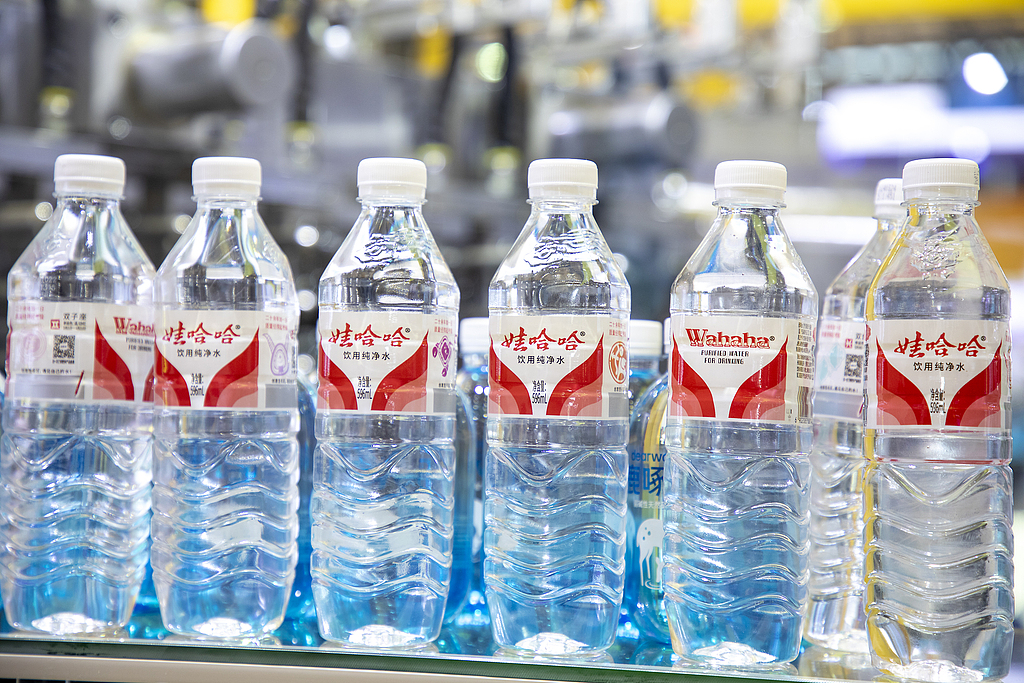
[Photo/VCG]
In 2024, beverage producer Wahaha Group paid 2.4 billion yuan ($331.28 million) in salaries to frontline employees, a 20 percent year-on-year increase, according to a recent report by Chinese news outlet The Paper.
This represents an increase of 400 million yuan compared to the previous year.
The average salary for production workers rose by 23 percent, while frontline sales staff in marketing saw a 31 percent increase.
Together, these two worker groups account for 93 percent of Wahaha's total workforce.
At Wahaha's New Year's gathering, Chairwoman and General Manager Zong Fuli, presented apartment keys to 10 young employees.
These apartments, located in Haining, Zhejiang province, are part of Wahaha's public rental housing program.
The company provides subsidized housing to employees with significant tenure and outstanding performance, offering rents far below market rates.
Over the years, Wahaha has built more than 1,000 employee apartments in cities like Haining; Chengdu of Sichuan province; Tianjin and Chongqing alongside providing over 2,000 housing units as welfare for married core employees. Additionally, it has disbursed more than 50 million yuan in housing subsidies and provided free dormitories with free utilities.
These initiatives reflect Wahaha's commitment to creating a supportive and motivating environment for its employees.
Meanwhile, competitors in the bottled water and beverage industry are pursuing other ambitious projects to enhance their social impact and market position.
Nongfu Spring, for instance, announced a significant philanthropic plan in the beginning of 2025, according to The Paper.
Nongfu Spring's founder, Zhong Shanshan, revealed his intention to donate 4 billion yuan over the next decade to establish Qiantang University, which is currently under construction in Hangzhou, Zhejiang.
Zhong, who has built a business empire spanning packaged drinking water and beverages, addressed the company's annual meeting with a 40-minute speech to share his vision for the company and the university under construction.
As for the company's financial performance, Nongfu Spring reported revenues of 22.17 billion yuan in the first half of 2024, an 8.4 percent year-on-year increase. Net profit reached 6.24 billion yuan, up by 8 percent.
Packaged drinking water and tea beverages remained its primary revenue drivers, accounting for 38.5 percent and 38 percent, respectively.
The company's green-bottle packaged drinking water launch was another notable success, further strengthening its market presence.
While Wahaha and Nongfu Spring have taken different approaches to growth — one focusing on employee welfare and the other on philanthropy — both companies are navigating an increasingly competitive bottled water and beverage market.
The natural mineral water market, for example, is expected to have exceeded 21.3 billion yuan in 2024, with a growth rate of 17 percent, outpacing the overall growth of the packaged drinking water segment.
Leading brands such as Nongfu Spring, C'estbon, Wahaha and Master Kong continue to dominate, but cross-industry players like Genki Forest are also making inroads.
Independent consumer industry analyst Yang Huaiyu believes that competition in the bottled water market is intensifying.
While major brands enhance competitiveness through technological innovation and brand-building, smaller players may need to adopt differentiated strategies to break through market barriers, Yang was quoted by Beijing Business as saying.
In this challenging environment, Wahaha's resurgence is particularly notable. After a low performance in 2023, when sales totaled 51.2 billion yuan, the company made a remarkable turnaround in 2024 under Zong's leadership.
Strong growth in bottled water and milk beverage products helped Wahaha reach 70 billion yuan in revenue, a 40 percent year-on-year increase.
Zong said it is vital to focus on the bottled water and tea beverage markets this year, saying recently that, "As entrepreneurs, we must focus on the long-term and commit to doing what is difficult but right."
wangzhuoqiong@chinadaily.com.cn